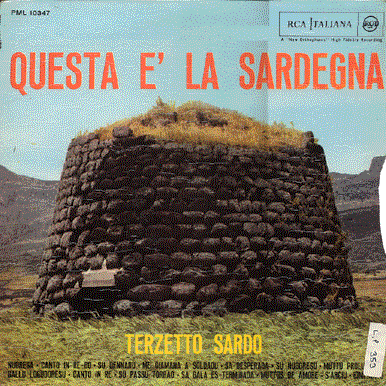

QUESTA E' LA SARDEGNA

(
View LP Cover
)
QUESTA
E' LA SARDEGNA
| LATO 1 NUORESA CANTO IN RE-DO SU DENNARU ME GIAMANA A SOLDADU SA DESPERADA SU NUGORESU MUTTU PROLUNGADU |
LATO 2 BALLU LOGUDORESU CANTO IN RE SU PASSU TORRAO SA GALA ES TERMINADA MUTTOS DE AMORE S'ARCIU RIMPIANTO |
|
|||
|
|
NUORESA | ||
|
|
CANTO IN RE-DO | ||
|
|
SU DENNARU | ||
|
|
ME GIAMANA A SOLDADU | ||
|
|
SA DESPERADA | ||
|
|
SU NUGORESU | ||
|
|
MUTTU PROLUNGADU | ||
|
|
BALLU LOGUDORESU | ||
|
|
CANTO IN RE | ||
|
|
SU PASSU TORRAO | ||
|
|
SA GALA ES TERMINADA | ||
|
|
MUTTOS DE AMORE | ||
|
|
S'ARCIU | ||
|
|
RIMPIANTO | ||
|
QUESTA E' LA SARDEGNA - TERZETTO SARDO -FRANCESCO
MARICOSU, FISARMONICISTA |
| LATO 1. 1. NUORESA (Canu-Chelo-Fara) (2:40) 2. CANTO IN RE-DO (Canu-Chelo-Fara) (2:55) 3. SU DENNARU (Tradizionale) (3:451- 4. ME GIAMANA A SOLDADU (Canu-Chelo-Fara) 13:27) 5. SA DESPERADA (Chelo-Fara) (3:00) 6. SU NUGORESU (Tradizionale) (3:54) 7. MUTTU PROLUNGADU (Chelo-Fara) (2:55) 1. 2. 4. 5. 7. TERZETTO SARDO 3. 6. FRANCESCO MARICOSU |
LATO 2. 1. BALLU LOGUDORESU (Fara) (2:35) 2. CANTO IN RE (Canu-Chelo-Fara) (3:06) 3. SU PASSU TORRAO (Tradizio¬nale) (3:47) 4. SA GALA ES TERMINADA (Canu-Chelo-Fara) (2:41) 5. MUTTOS DE AMORE (Canu-Chelo-Fara) (2:41) 6. S'ARCIU (Tradizionale) (3:46) 7. RIMPIANTO (Canu-Fara) (3:25) 1. 2. 4. 5. 7. TERZETTO SARDO 3. 6. FRANCESCO MARICOSU |
| In Sardinia, folklore and
folk art are, without question, more keenly felt than in any other part
of Italy, penetrating every form of life and expression, even today when
just about everywhere so-called "progress" is little by little breaking
down and destroying all the more genuine popular traditions. And, naturally enough, this still-intact purity of spirit lies at the root of the most spontaneous and simplest forms of Sardinian folk art, such as dancing and singing, which retain all their pungent appeal, all the immediate freshness of age-old artifacts utterly untouched by time. Sardinian folk songs. for that matter, are intimately related to dance, inspired, as they are, by a vigorous, tumultuous and varied rhythmic pulse; some of them resemble even the ancient one-stanza love lyric, with inflexions of Gregorian chant or set in a choral solemnity of style. Canu and Chelo, accompanied by Fara on the guitar, have remained the bards of Sardinian folk music, warm-hearted troubadors who wander from village to village, festa to festa, bringing with them the gaiety of dance and song. The songs they sing on this record, taking turns as it were, are drawn from the purest sources of local folk¬lore and, according to a tradition which is still very much alive, handed down orally from generation to generation over hundreds of years, without ever losing anything of their original beauty. Beneath the apparent uniformity of their rhythmic cadence and set instrumental formulas is to be found a full range of feelings and varying moods : from "Nuoresa" to the tumultuous "Ballu logudoresu", from "Sa desperada" to "Sa gala es terminada", a lighthearted song of leave-taking after a country festa which ends by inviting one and all to turn his steps homeward; from "Me giamana a soldadu" (They're calling me up to be a soldier) to "Muttos de amore", a passionate declaration of love. Extremely florid melodies where the suggestion of antique modes gives the listener the constant thrill of new and unexpected sensations; true and authentic songs which spring from the very soul of the people and which reflect all the savage, proud and noble nature of Sardinis - a land where time indeed seems to have cóme to a stop. B. M. |
La Sardegna è fra le regioni
italiane quella ove certamente più che altrove il folklore è rimasto
vivissimo, sino a permeare di sè tutte le forme di vita e d'espressione,
anche oggi che il «cosiddetto» progresso va a poco a poco soffocando un
pò dappertutto le più genuine tradizioni popolari. E, naturalmente, di
questa intatta verginità si avvalgono le più semplici e schiette forme
dell'arte popolare sarda, quali la danza e la canzone, che mantengono tutto il saporoso fascino, tutta l'immediata freschezza di remote creazioni che il tempo non ha minimamente scalfito. La canzone sarda è d'altra parte connessa alla danza, cui si ispira nel ritmo vigoroso, turbinoso e vario: talora persino riecheggia l'antica lirica monostrofica d'amore, con inflessioni gregoriane o con solennità «corale» d'accenti, Di queste musiche Canu e Chelo, accompagnati dal chitarrista Fara, son rimasti gli aedi, i cantori generosi che vanno eseguendole di paese in paese, di festa in festa, suscitando sempre intorno a sè danze e allegria. Le canzoni che, quasi a turno si direbbe, eseguono in questo disco a loro dedicato, appartengono al più schietto patrimonio folkloristico locale, fatto di canti che oralmente si tramandano, secondo una tradizione che è tuttora viva e vissuta. di generazione in generazione da tempi certo remotissimi, senza peraltro nulla perdere della loro viva bellezza. E vi è in esse tutta una gamma di sentimenti e di mutevoli stati d'animo, sotto l'apparente uniformità della cadenza ritmica e della formula strumentale: da tNuoresa» al vorticoso Ballu logudoresu», da «Sa desperada» a «Sa gala es terminada» (La festa è finita), allegro commiato da una festa campestre, che infine invita tutti a tornare alle proprie case; da «Me giamana a soldadu» (Mi chiamano a fare il soldato), a «Muttos de amore» (Parole d'amore), tutta un'esaltazione appassionata della donna amata.Sono melodie estremamente fiorite, in cui il sapore di modalità arcaiche offre all'ascoltatore occasione di sempre nuove e inaspettate sensazioni. Sono canti genuini che scaturiscono dall'istessa anima del popolo ed in cui si riflette tutta la selvaggia, fiera, nobile natura della Sardegna - una terra in cui il tempo sembra veramente essersi fermato. B. M. |

